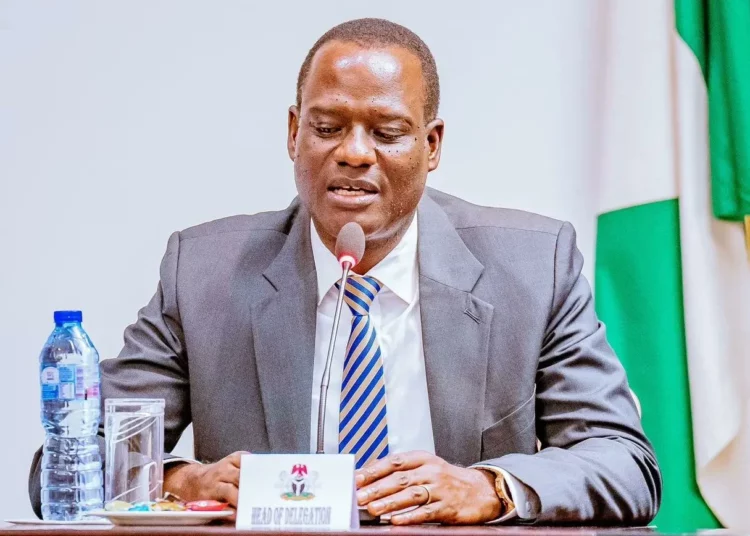The chairman, Presidential Committee on Fiscal Policy and Tax Reforms, Taiwo Oyedele, has declared that the savings accruing from the removal of fuel subsidy were grossly inadequate to fund Nigeria’s huge development requirements.
Oyedele made this assertion on Wednesday in Abuja while delivering a keynote address at a one-day capacity building training on the Nigeria Tax Act (2025) for members of the State House Press Corps.
He insisted that the country must embrace a comprehensive tax reform agenda to reposition its economy for sustainable growth.
He explained that Nigeria’s total annual budgetary outlay — covering the federal government, 36 states, the Federal Capital Territory (FCT), and all 774 local government areas — is less than $50 billion, a figure he described as insufficient for a nation of over 200 million people.
“Even if you remove corruption and waste completely, the resources at our disposal are not enough to transform Nigeria. Subsidy savings alone cannot deliver the level of infrastructure and services required. Our fiscal space is simply too small,” he said.
Oyedele noted that the subsidy regime had left the federation on the brink of collapse, with the Nigerian National Petroleum Company Limited (NNPC) not only withholding remittances but also leveraging future crude production as collateral to pay for petrol imports.
According to him, the recently debated five per cent fuel surcharge is not a new tax, but a provision that had existed in the Federal Roads Maintenance Agency (FERMA) Act since 2007.
He clarified that the new Tax Reform Law transfers the surcharge to a broader fiscal framework, with safeguards for transparency.
“This surcharge will not commence automatically in 2026. It requires a commencement order from the Minister of Finance, duly published in the Gazette. The intent is to ensure openness and accountability in application, unlike in the past,” Oyedele explained.
He added that more than 150 countries dedicate fuel-related levies to road maintenance, stressing that Nigeria cannot continue to depend on printed money to fix its infrastructure.
He noted that while South Africa boasts an infrastructure-to-GDP ratio of 85 per cent, Nigeria is struggling at around 30 per cent, a gap that directly undermines productivity and growth.
“You cannot grow an economy when people and goods cannot move around efficiently. The reality is that we need dedicated funding for roads and infrastructure. Subsidy savings will not cover this gap,” he warned.
Oyedele also addressed concerns around the introduction of a new tax identification system, clarifying that there will be no fresh card or registration exercise.
“We are not creating another layer of bureaucracy. What we have done is to harmonise identification. If you already have a National Identification Number (NIN) or Bank Verification Number (BVN), you need not worry. These will serve as tax IDs. The objective is simplification, not complication,” he stated.
He disclosed that the new tax reforms were designed to provide relief to the majority of Nigerian workers and entrepreneurs. Under the law, small businesses with an annual turnover of less than ₦100 million will enjoy 0 per cent corporate tax, while low- and middle-income earners — representing about 97 per cent of the workforce — are exempted or relieved from several tax burdens.
He further explained that essential goods and services such as food, education, and healthcare have been classified as zero-rated for Value Added Tax (VAT), allowing producers to reclaim input VAT paid in the production process, thereby lowering overall production costs and stabilising consumer prices.
Oyedele raised concerns about Nigeria’s history of policy inconsistency, warning that constant reversals have cost the nation trillions of naira and undermined reforms.
He cited the demolition of toll gates in the early 2000s and the reversal of government refinery privatisation as examples of policy missteps that drained national resources.
“The simple question at the time was not how to stop leakages at toll gates, but why we did not build systems to ensure accountability.
“Because of that reversal, we are now back to discussing tolling and fuel surcharges more than two decades later. The same thing with refineries — if we had not reversed the sales, Nigeria would have saved over ₦20 trillion and created jobs,” he said.
He urged the National Assembly to support constitutional amendments that will safeguard fiscal reforms against reversal, including provisions to criminalise arbitrary levies at the subnational level.
“Our democracy must be structured to outlive political cycles. Otherwise, we waste sacrifices, and the country pays a heavy price. Reform is not about one administration; it must be institutional,” he added.
Oyedele urged Nigerians, particularly the media, to report the reforms with responsibility and objectivity, emphasising that negative narratives risk undermining reforms that are in the public interest.
“We must focus on facts. The subsidy removal stopped an imminent economic collapse, but it is only the beginning.
“The wider tax reforms are meant to create fairness, remove multiple taxation, and provide sustainable funding for infrastructure. If we stay the course, the benefits will begin to manifest at the household level from 2026,” he assured.




